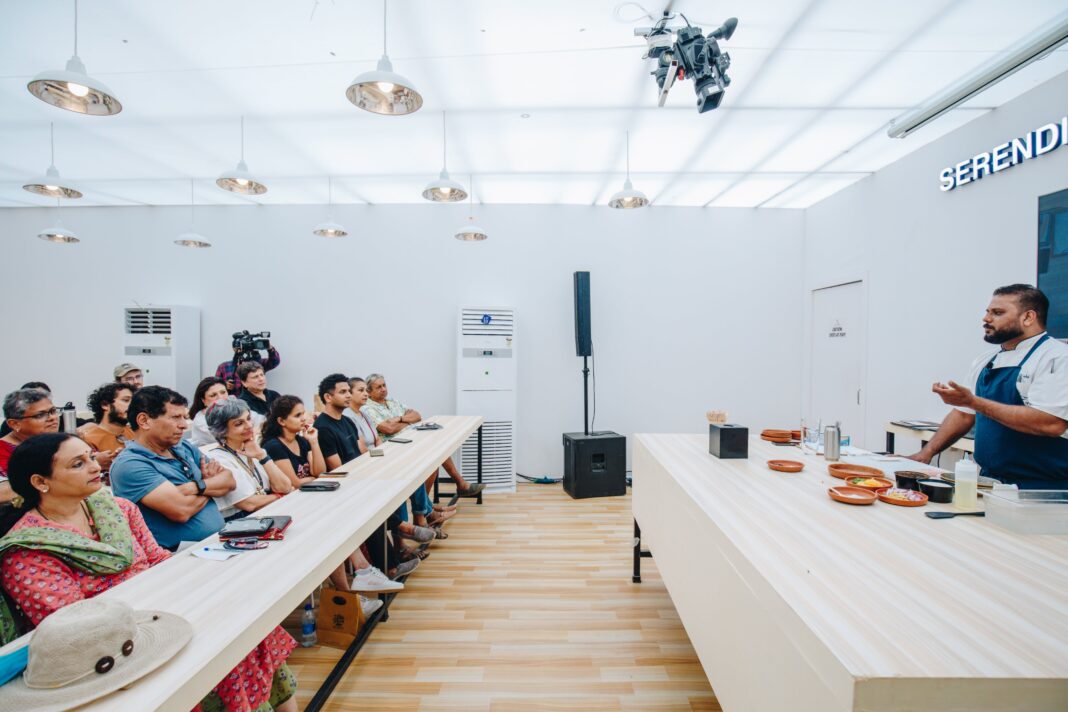
Despite demand, Goa seafood restaurants need to use fish sustainably: Culinary Expert
~ Due to exponential demand for fish from Goan waters locally and internationally, Goa must
promote sustainable fish farming and observe the annual fishing ban to avoid a fish famine.
~ Eating seasonal local produce has better nutritional value and health benefits.
Panaji, December 2023 – Goa’s seafood restaurants need to use their primary resource,
fish, sustainably and preserve the local ecosystem to prevent fish famine off the coastline, a phenomenon caused by overfishing, according to chef Abhishek Deshmane, who conducted a workshop ‘Reimagined Coastal Food’ on the second day of the ongoing Serendipity Arts Festival (SAF) 2023.
Deshmane, an executive chef at the popular Slow Tide Restaurant, specialising in seafood
in Anjuna, also spoke about the importance of utilising local and seasonal ingredients
respectfully, as showcased through two dishes – Red Snapper Ceviche and Sasam Salad.
“Restaurateurs and stakeholders in the food and beverage industry should pay attention to
local customs and traditions surrounding food and follow the local (sustainability) calendar.
There is one particular calendar called ‘Know Your Fish: Seafood Recommendations’ that is
a sustainable ocean-sensitive seafood calendar for the west coast of India,” said Deshmane,
who was a key facilitator at the workshop, which was a part of the Festival’s culinary
segment curated by Chef Thomas Zacharias and The Locavore Team.
Deshmane stated that the fish breeding season coincides with the auspicious month of
Shravan during the Goan monsoon season. As the consumption of non-vegetarian items is
not recommended during this period, there is a shift within the restaurant industry to local
vegetables and grains to accommodate religious sensibilities. Those who do not observe
Shravan can opt for pickled or preserved fish, such as balchão (a pickling method introduced by the Portuguese during their colonial rule) and para (a Goan spiced and pickled dried fish recipe), he said.
“During the monsoons, vegetarian delicacies like yam and colocasia leaves (patrodo in
Konkani) are widely available, which can substitute fish in the menu till the fishing ban during the breeding season ends,” said Deshmane.
The fishing industry in Goa is booming, with the coastal state’s seafood exports for the
current financial year crossing Rs. 1,500 crore. With the demand increasing exponentially in recent times,
Siddharth Savkur, CEO of the Kamaxi Group, which runs the country’s only culinary B-
school, also emphasised that everyone in the restaurant and food and beverage industries
should be educated about the importance of observing the fishing ban.
“Restaurants could use this period to showcase other meats and seasonal monsoon
produce. They could also patronise small, traditional fishermen during this period. Though
their haul is smaller, they offer varieties of small fish that are known to locals but go
unnoticed by tourists,” said Savkur.
When it comes to sustainable fishing practices, Deshmane stated that while fishing farms
would enable controlled breeding of red snapper or other fish, “strict regulations have to be
implemented to ensure that fish are bred ethically and malpractices like chemical
enhancement are eliminated.”
Deshmane also drew parallels between Goa and Peru, due to a shared Iberian colonial
heritage and spotlighted the association through the Red Snapper Ceviche dish that
Deshmane prepared during the workshop.
“Peru and Goa share several similarities – both are former colonies, Spanish and
Portuguese, respectively; they have good coastlines, similar climates and similar spicing
practices due to the proximity of Spain and Portugal and the trade routes established during the Age of Discovery in the 15 th century,” said Deshmane.
Deshmane’s Sasam Salad highlighted the importance of eating seasonal produce due to its
health benefits and cooling properties, which are now vital due to the changing climate. He
also used cashews in the fish to promote the essence of Goa.
The health benefits of consuming local seasonal produce were further underscored by Amey
Naik, secretary of the National Restaurants Association of India – Goa Chapter.
“In-season produce is fresher, harvested at the right time and naturally ripened, due to which
it has more flavours and nutrients. It also supports our body's natural nutritional needs as per the season and geographical location, ensuring we eat the best that the season offers. It also supports local farming,” stated Naik.




